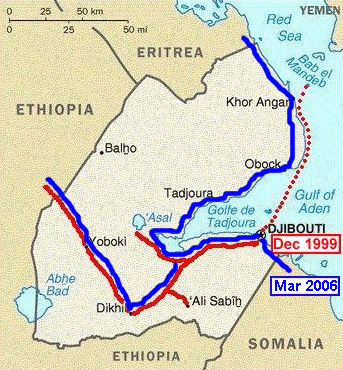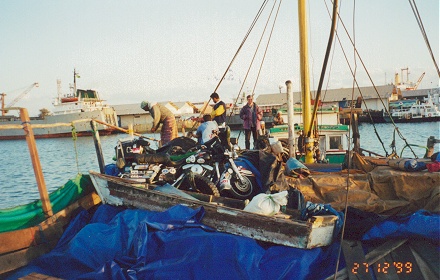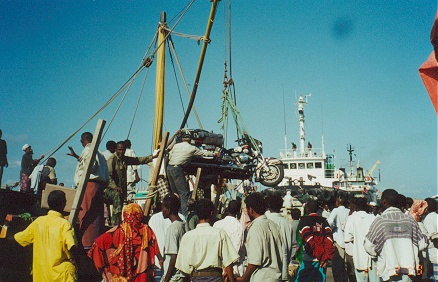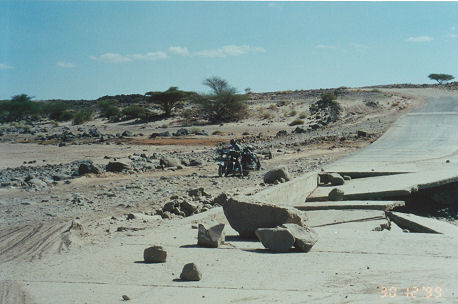
This is part of the Sixth section of our around the
world trip.
Complete Trip Overview & Map
Coming from Yemen

26/12/99 We hadn't eaten much yesterday but had a good sleep even on the wooded boards despite our knees, elbows, ribs and tailbones being rubbed by the boats pitching. The wind had dropped and we island hopped (leaving at 5 am) from Yemen to Djibouti across the bottom of the Red Sea shipping lane then along the Djibouti coast. The seas quite flat and we could move around the boat easily. The crew caught three mackerel, and despite it still being Ramadan they were cooked and eaten, supplementing our diet of rice, vegetable and chapati. Everything, including us, on the boat was covered in a thick layer of salt from yesterdays spray, where regularly we would be doused by a larger wave despite the extra planks and tarps used to raise the sides of the boat. We tied up in Djibouti harbour at 10 pm to find immigration closed till 8 am and spent another night on the wooden boards.
27/12/99 We were out of the port area by 10 am, the motorcycle
craned off the boat, immigration 15 minutes and customs with our carnet another
15 minutes and no charges. Due to the high price of hotels we decided to
stay in the African Quarter now grossly overcrowded with refugees from Somalia
and Ethiopia. There is a water shortage here with most water being barrowed
around in 20 litre containers and to wash the salt from the motorcycle we
were quoted $US 10.00, deferring to buy direct from the suppliers for $US
2.00 and wash it ourselves. The rest of the day spent resting and recovering.
28/12/99 Washed the salt from everything else, clothes,
bags etc. Women again making up a more normal 50% of visible people, open
faced, brightly dressed in loose fitting flowing sari type cloth. Both sexes
operating the thousands of small stalls of the markets. There seemed to
be many more sellers than buyers, clothes discarded by the west rejuvenated
and recycled here, shoes given a clean and new feet, fruit and vegetables,
souvenirs, chai and restaurants. Beggars are everywhere but few make it their
livelihood, there being insufficient cash donors, most are opportunistic children
or women with babies. The society being very tolerant of the needs of people
like the restaurant attached to our hotel. Boys or young men would wait politely,
not begging or intruding, for people to finish their meal, collect the plate,
and quietly in a back area eat any food remaining. Women with children would
wait quietly in the street with a plastic bag, the restaurateur would collect it
and place a small amount of food, they then proceeded to the next place for
a bit more.
a plastic bag, the restaurateur would collect it
and place a small amount of food, they then proceeded to the next place for
a bit more.
29/12/99 Before dawn is the best time to see a city awaken.
At 5 am the last food for the Ramadan day is consumed hurriedly before 5.30
prayer, every shop doorway and cleaned pavement has someone sleeping there
on their piece of cardboard under the cloth wrap (futa) used as a sarong,
even mosques double as bedrooms, the street is the urinary but has minimal
smell due to the meagre diet. By 6.30 am trucks carry workers, water is
barrowed around, shops open for the possibility of an early sale and stalls
are uncovered. In the evening we moved out of the African Quarter and into
the French, still housing 10,000 ex-pats, many with tourist friends escaping
a winter. Over tea in 30 minutes we were inundated in this wealthier area
by mobile street sellers of postcards, shirts, toys, shoe shine, watches
and of course beggars, legless, old, mothers and children. It would be hard to live in this area both for the
have's and the have not's, we were happy to return to our area, now almost
locals.
mothers and children. It would be hard to live in this area both for the
have's and the have not's, we were happy to return to our area, now almost
locals.
30/12/99 Out of the city of Djibouti to the lakes of Goubet
and Assal as a quick detour then onto Dikhil the last of reasonable roads.
From here to the Ethiopian border the trucks (usually using the road to Eritrea
for all Ethiopia's imports, but because of the war must now import everything
through Djibouti) have disintegrated the previously asphalt road and worn
down the gravel to bedrock in places. Three hours for the 100 km to the border.
Move with us to Ethiopia
or go to our next visit to Djibouti
|
Story and photos copyright Peter and Kay Forwood, 1996-
|